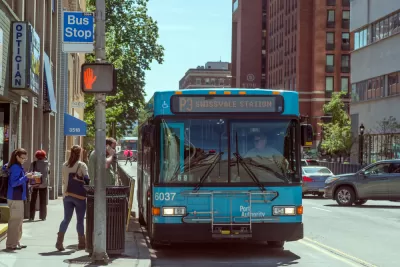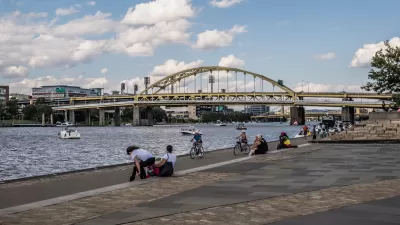The program aims to improve access to jobs and economic opportunities for some of the city’s most underserved neighborhoods.

A new “Guaranteed Basic Mobility” program will offer up to 50 Pittsburgh residents free access to the city’s shared mobility and public transit services, reports Danielle McLean in Smart Cities Dive. The year-long program is aimed at increasing access to jobs, education, and services for low-income residents in the Manchester and Chateau neighborhoods.
The program follows similar initiatives in Los Angeles, Oakland, and Portland. Tosh Chambers, senior program director with Pittsburgh’s Move PGH pilot, “hopes that the micromobility options offered under the program will be utilized as a first and last-mile connector to the light rail station located just outside of [Manchester].”
In addition to the 50 residents that will receive free transit benefits, a control group of 50 other residents will be compensated for participating in surveys. By including public transit, scooters, bike share, and car sharing in the program, the city hopes to answer a key question: “If someone has every type of transportation option available to them, what combination of modes will they rely on?”
The city plans to produce a report at the end of the pilot program with hopes that they can find funding for future expansion.
FULL STORY: Guaranteed basic mobility pilot offers near-unlimited transit access to 50 Pittsburgh residents

Planetizen Federal Action Tracker
A weekly monitor of how Trump’s orders and actions are impacting planners and planning in America.

Chicago’s Ghost Rails
Just beneath the surface of the modern city lie the remnants of its expansive early 20th-century streetcar system.

San Antonio and Austin are Fusing Into one Massive Megaregion
The region spanning the two central Texas cities is growing fast, posing challenges for local infrastructure and water supplies.

Since Zion's Shuttles Went Electric “The Smog is Gone”
Visitors to Zion National Park can enjoy the canyon via the nation’s first fully electric park shuttle system.

Trump Distributing DOT Safety Funds at 1/10 Rate of Biden
Funds for Safe Streets and other transportation safety and equity programs are being held up by administrative reviews and conflicts with the Trump administration’s priorities.

German Cities Subsidize Taxis for Women Amid Wave of Violence
Free or low-cost taxi rides can help women navigate cities more safely, but critics say the programs don't address the root causes of violence against women.
Urban Design for Planners 1: Software Tools
This six-course series explores essential urban design concepts using open source software and equips planners with the tools they need to participate fully in the urban design process.
Planning for Universal Design
Learn the tools for implementing Universal Design in planning regulations.
planning NEXT
Appalachian Highlands Housing Partners
Mpact (founded as Rail~Volution)
City of Camden Redevelopment Agency
City of Astoria
City of Portland
City of Laramie





























